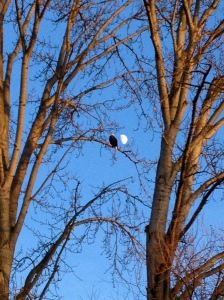An enchanted life has many moments when the heart is overwhelmed with beauty and the imagination is electrified by some haunting quality in the world or by a spirit or voice speaking from deep within a thing, a place, or a person. ~ H.L. Mencken
Oh great, here comes AFPGO: Another Fucking Personal Growth Opportunity. ~ Unknown
About a mile into a run last week, I stopped. Just stopped. I couldn't. There are times when my body needs a break from running and I try to listen. I try not to judge. I walked home with tightness in my chest and heaviness in my limbs. I thought, "I'll just swim laps at nine." Nine came and I lowered myself into a hot bath. That was the water I needed, water like the warmth of the womb. I needed to be comforted, not challenged. I needed to soak, before I sank. I was utterly overwhelmed.
The slow creep of mud that finally reached my mental shoes, stopping me in my tracks—this weird blend of acedia and agitation—wasn't a surprise; I'd felt it coming. It started, perhaps, a couple of weeks ago, when I found myself in the midst of a tremendous online chorus of writers, some of whom are my literary heroes. I was amazed and delighted to have been included in their ranks. Their voices swelled and rose in a mighty roar of energy and affirmation that took my breath away. I found my way through the crowd to quieter corners and rooms down the hall, making personal connections with a few voices that reached me with calm clarity, but I couldn't shake the feeling that somehow I didn't belong there, that these writers, these thousands, were accomplished and ambitious in ways that are completely foreign to me, perched as I am on this almost-island, in my quiet sunroom, spinning my modest tales that no one would mistake for great literature or groundbreaking creative non-fiction.
Time to retreat. I stopped reading the bios that made me feel so woefully inadequate, I withdrew from conversations that sped past faster than I could read or type, reminding myself that time spent wishing I was more, did more, risked more, reaped more, was time spent not doing the one thing that mattered most: writing.
I returned to my keyboard and to my mind, wrote a flash fiction piece, finished the first draft of short story, and began researching literary journals to submit each. I did yoga on the beach, I hiked, I walked. I read a volume of beautiful poetry. I filled two boxes for Goodwill, because when I get like this, I want to lighten all my burdens, I want to clean out, get rid of, eliminate, discard, set myself free.
But still the disquiet remained. A torpor dulled my sense of possibility and joy, sitting heavy in my core, while anxiety beat a woodpecker's refrain against my heart. I knew I hadn't gone far enough in seeking the peace that would guide me to back into the light.
When the interwebs cease to be a source of information, of playfulness, of social release and friendship, I know that something is happening inside of me that bears watching. I know it's time to be careful, that the world is about to swallow me with noise. When I agitate instead of participate, it's time to shut it all down and walk away.
When I begin to despair that my writing doesn't stack up and that my future will never brush the dizzying heights of those in my online communities, it's time to recommit myself to the page.
Echoing a remark a writer friend made here recently, it's possible to read too much about and into the writing and publishing process. It's possible to fill your mind with so much advice on craft, so many dos and dont's of seeking publication, that you get mired down and find yourself unable to move forward.
It's possible to let the world get too loud.
I shared a draft of my query letter on a limited-public board last week, seeking critiques from fellow writers. One commented that my query was too perfect, too textbook. I'd felt the same, so the comment didn't sting, it confirmed. It came as a relief. I was right. In trying so hard to adhere to all the pro tips, I'd lost my voice. I rewrote it (again. again. again.) and I feel there's more of me in there, but it's not yet where it needs to be.
Until I can find my stride and run again, I'm deleting those writers' tips blog posts that get routed to my inbox. Until I feel safe in myself again, I'm staying away from the social media where I feel vulnerable.
I want to be overwhelmed with beauty. I want to be electrified by some haunting quality in the world or by a spirit or voice speaking from deep within. These happen only in two places for me: outside and on the page. That's where you'll find me, in case you're wondering where I've gone off to ...
7/5/14
ETA: A couple of wonderful articles have made their way into my life in the week since I first published this post. Just had to share:
The Secrets of the Creative Brain by Nancy Andreasan, for The Atlantic
Why Every Story You Write is a Guaranteed Failure by K.M. Weiland, on her eponymous blog






